Trypanophobia: description and ways to overcome fear
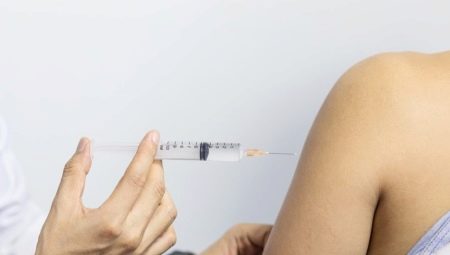
Perhaps there is no person in the world who is completely indifferent to the injections that he has to do. Mild excitement, expectation of pain for at least a few seconds is a normal reaction to an impact that cannot be considered painless. But there are people (and there are a lot of them) who have the prospect of giving an injection, even if life depends on it, causes panic uncontrollable horror.... This phenomenon is called trypanophobia.
Description
Trypanophobia is a mental disorder that is considered one of the most common in the world. This is a pathological fear of injections, needles, syringes and injections.... According to medical statistics, about 15% of the world's inhabitants suffer from such a fear. It is noteworthy that in countries where disposable syringes with thin needles that do not cause intense pain when injected earlier appeared, the number of people suffering from this disorder is lower, for example, in the United States, trypanophobia is diagnosed in 10% of residents.
In Russia and the post-Soviet space, where thick metal needles of reusable syringes have been used for a long time, the fear of injections is higher - up to 20% of our country's residents suffer from trypanophobia. This suggests that this phobia is closely related to the quality of medical care. But this is not the only prerequisite for the development of the disorder.
Trypanophobia usually develops during childhood., for this it is often called fear from childhood. Trypanophobia should not be confused with jatrophobia - fear of doctors, fear of visiting hospitals, undergoing examinations, being tested, and being treated.
Often these two phobias go side by side, many jatrophobes are afraid not only of people in white coats, but also of injections.But many trypanophobes are not afraid of doctors and nurses, they can safely go to the clinic, go to a therapist if they are sick, get tested if they are not related to punctures and injections.
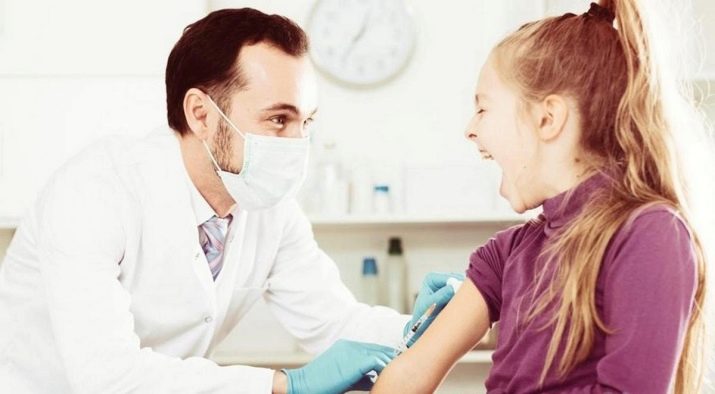
But the appointment of injections can plunge a person into a state of acute anxiety, and attempts to drag him into the treatment room can end in a panic attack.
Trypanophobe himself usually honestly admits that he is afraid of injections. Many people with such a disorder do not see anything unusual in this at all; in their understanding, anyone should be afraid of injections. But in a dangerous situation, people with trypanophobia lose the ability to control their behavior - they can faint at the sight of a syringe, start to break free and run away, some are constrained by such fear that they cannot cross the threshold of the treatment room. In any situation where the injections can be replaced with pills or something else, trypanophobes will definitely take advantage of this.
Whether this phobia is dangerous is difficult to say. As long as a person is healthy and there is no need for injections, his life is no different from the life of everyone else. This fear does not bother him in any way. But if you get sick, if there is an urgent need for an injection, and the person falls into an anxiety state.
Waiting for an injection is more painful for him than the injection itself. Some fobes refuse injections on principle, despite the arguments and persuasions of doctors. And it is this refusal that can cause serious health problems and a threat to life.
There are drugs that can only be taken by injection or drip. There are situations in which delay can cost the patient's life, and then an injection is the best way to quickly deliver the required drug to the patient's body.
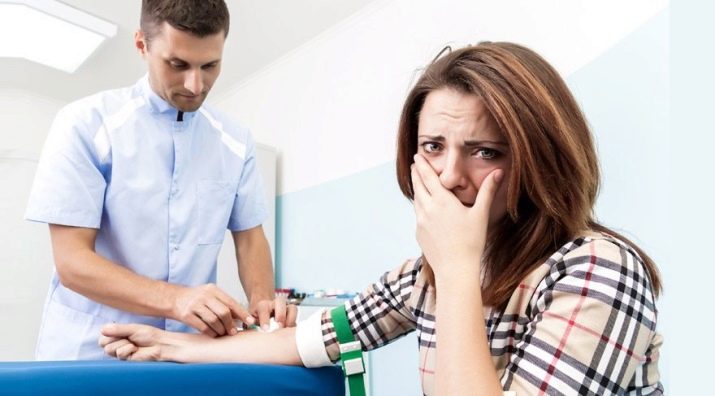
Signs
It is not that hard to recognize a true trypanophobe. Many people say they are afraid to give injections, but these are just words. A real trypanophobia sufferer does not like to talk about this topic, because even the thought of such a procedure as an injection, be it intravenous or intramuscular, gives him suffering. There are patients who are panicky afraid of injections into a vein, there are those who are afraid of a puncture of the buttocks, many successfully combine the fear of all types of injections, including before taking blood from a finger for a general analysis with a scarifier.
People with this disorder try to plan their lives in such a way that they can avoid injections. If it is possible not to get vaccinated, they will not. If there is even the slightest chance of avoiding medical examination, where they take blood for analysis, they will definitely take advantage of this.
At the doctor prescribing the treatment, the trypanophobe will necessarily meticulously find out whether it is necessary to give injections, whether there is a chance to replace them with pills or medicine, if not, he will check the information with other doctors and on the Internet several times. Anxiety will build, and eventually the trypanophobe will definitely try to find an excuse not to go for the injections. If this is not possible or the need for an injection has arisen suddenly, he cannot hide his horror.
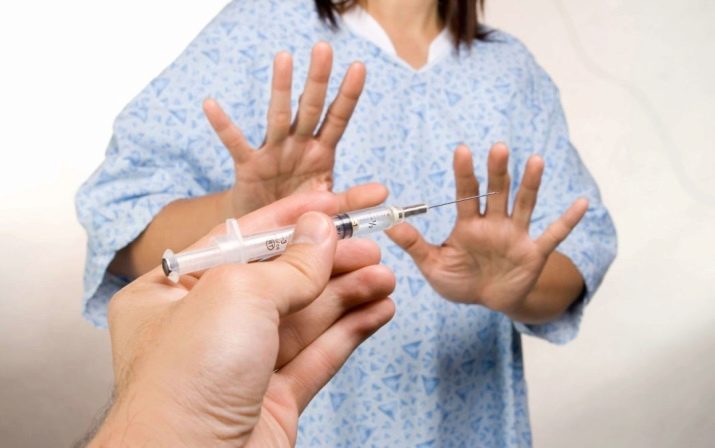
A lion's dose of adrenaline is instantly released into the bloodstream. Under his influence quickly pupils dilate, hands begin to shake, lower lip... The skin becomes pale due to the outflow of blood (the body, at the signal of danger, does everything to provide more blood for the muscles, because it is possible that you will need to run or fight).
The heart begins to beat quickly, breathing becomes shallow, intermittent and shallow. The body temperature decreases slightly, and the patient becomes covered with a sticky cold sweat. Vomiting may begin, clouding and loss of consciousness may occur, a message may arise to break free and run away - in many respects, the symptomatic picture is individual and depends not only on the severity of the phobia, but also on the character and personality of the person.
After a panic attack, trypanophobia patients feel emotionally drained, tired, and ashamed. They are critical of themselves, are well aware of the absurdity of the situation, but they cannot do anything to prevent the panic attack from repeating in the future. The brain itself launches these processes, for the most part they are beyond the control of a person.
What is trypanophobe really so afraid of? Not everyone is afraid of the very moment of puncturing the skin with a sharp needle. Some people experience a chilling horror at the thought of being injected with medicine through a needle, they literally feel how it spreads under the skin, over the muscles. They painfully perceive the injection procedure itself. Some are afraid that after the injection there will be bleeding, bruises, bumps, and prolonged pain.
Many are afraid of contracting dangerous infections and getting small air bubbles that can get into the needle when dialing the medicine. Sometimes it is not only the whole process with all its stages that frightens you, but also the very appearance of needles and syringes, even if they are not intended directly for a given patient - in the movies, in pictures and photographs.
Phobia is equally common for both men and women. There was no significant gender difference. But trypanophobic men have one unpleasant feature - they are more prone to manifestations of panic attacks than women.
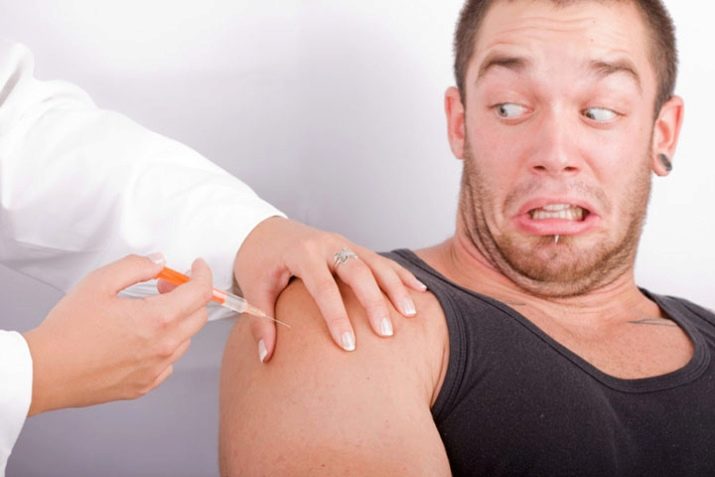
Representatives of the fair sex behave, despite the horror, much more decently.
Causes of occurrence
Fear of injections is formed in childhood, and the behavior of the parents, and the characteristics of the temperament, and the character of the child contribute to it a lot. All babies are given shots, such as vaccinations. But some steadfastly experience this, cry, take offense and soon forget about the injection, while others develop a strong fear of a repetition of the situation. Children with increased excitability of the nervous system, a weak pain threshold, impressionable children with a rich imagination and increased anxiety are more prone to the development of a phobia.
In such children, fear can be caused not only by their own feelings of injections, but also stories, films, read books, photographs. A scary story about a "black hand" that made its way into children's rooms and pricked children with a needle with poison can cause intense feelings. History will eventually be forgotten - memory is designed in such a way that it erases unnecessary information that a person does not use. But at the subconscious level, there will be a clear connection between needles, syringes and something terrible, deadly, with a threat.
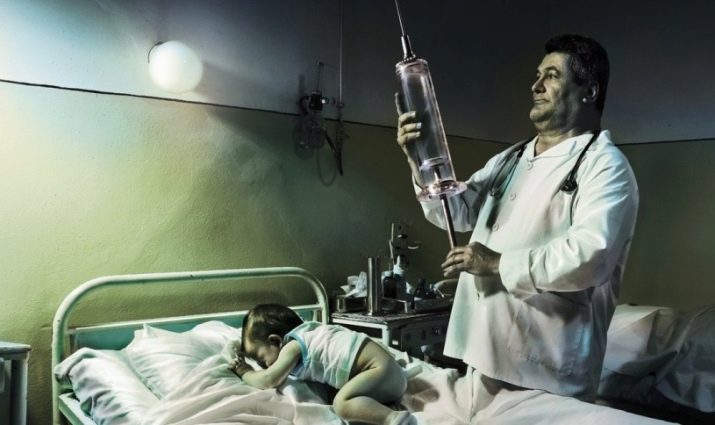
The behavior of the parents can be adequate (we need to give an injection - we will do it), or it can be restless and worrying. A mother who is more nervous before the vaccination of the child increases the level of anxiety in the child.
There are parents who tell their children that if they do not eat or stop walking in puddles, they will get sick and then they will have to go to the hospital for injections. In such cases, pay attention, adults always talk about injections. If a child is suspicious and impressionable, such statements alone are enough to maintain a panic fear of manipulating syringes for the rest of his life.
The reasons may lie in negative personal experience - an unsuccessful injection, complications, rudeness of the medical staff, thick needles. In this case, the image of the syringe is directly related to pain. There is no other association. And being afraid of pain is, by and large, a normal defense mechanism. Only in trypanophobes does it acquire abnormal, hypertrophied proportions.
It should be noted that parents with this problem most often raise children who suffer from trypanophobia. It's not about genetics, not about heredity, but about an illustrative example - the child takes at face value the model of the world and interaction with it proposed by the parents. The fear of a mother or father before a simple medical manipulation can simply be taken on faith, then a persistent deep phobia is also formed.
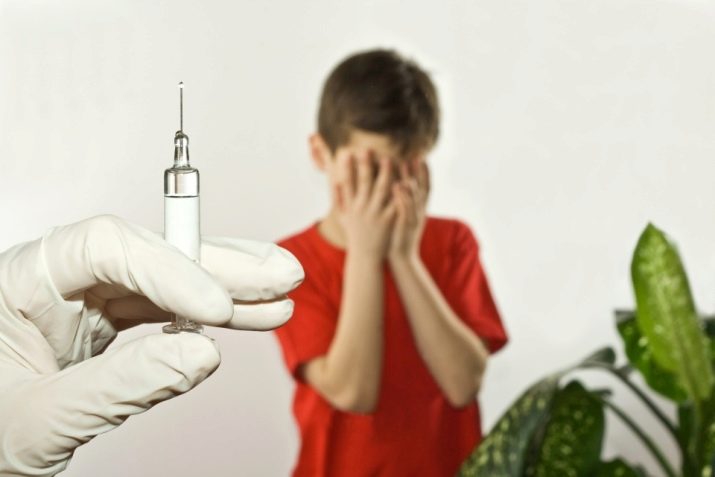
In the future, the prospect of getting an injection in the buttock or vein will be perceived by the child as a very dangerous situation.
Control methods
Calls to fight the fear of injections, pull yourself together with an effort of will and defeat the phobia that is replete with the Internet, in practice, can do little to help true trypanophobes. The thing is that at the moment of danger they cannot control manifestations of fear, therefore, there can be no question of any efforts of the will. Mental disorder needs assistance qualified psychiatric and psychotherapeutic assistance.
The most effective method is considered cognitive behavioral therapy... This technique helps to identify the real causes of fear. An experienced therapist will not advocate overcoming the horror, he will simply try to change the patient's core beliefs that trigger the chain reaction of the panic attack. Classes can be individual and group, additionally can be applied suggestion, hypnosis, NLP, teaching the patient auto-training, methods of deep muscle relaxation.
As soon as the first stage is left behind, the patient is gradually immersed in situations in which he will be surrounded by images and objects that previously frightened him. And it's good if at first a person can talk about injections without worry, then he can pick up a syringe, and then he will allow himself an injection of vitamins intramuscularly.
In addition to psychotherapy, drug treatment - antidepressants are prescribed to relieve symptoms of anxiety and depression. If you notice in a child signs of fear of injections, you do not need to ignore them and wait for the child to "outgrow the fears by itself." Seek help from a psychologist. The younger the phobia, the easier it is to get rid of it.

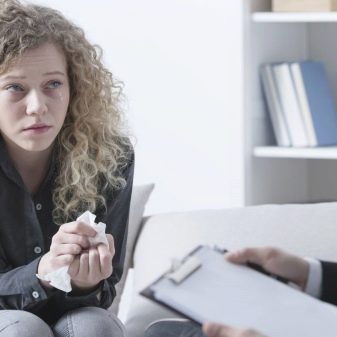
Children are helped by effective methods of art therapy and fairy tale therapy, as well as play therapy, for example, playing a doctor.








